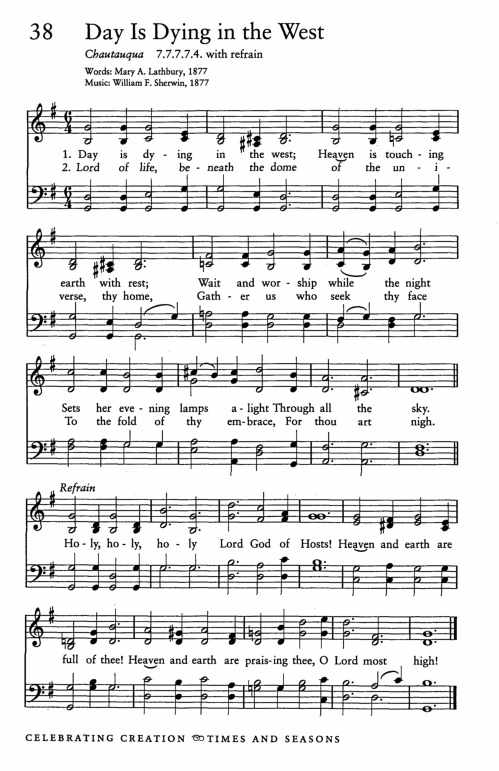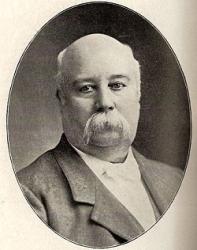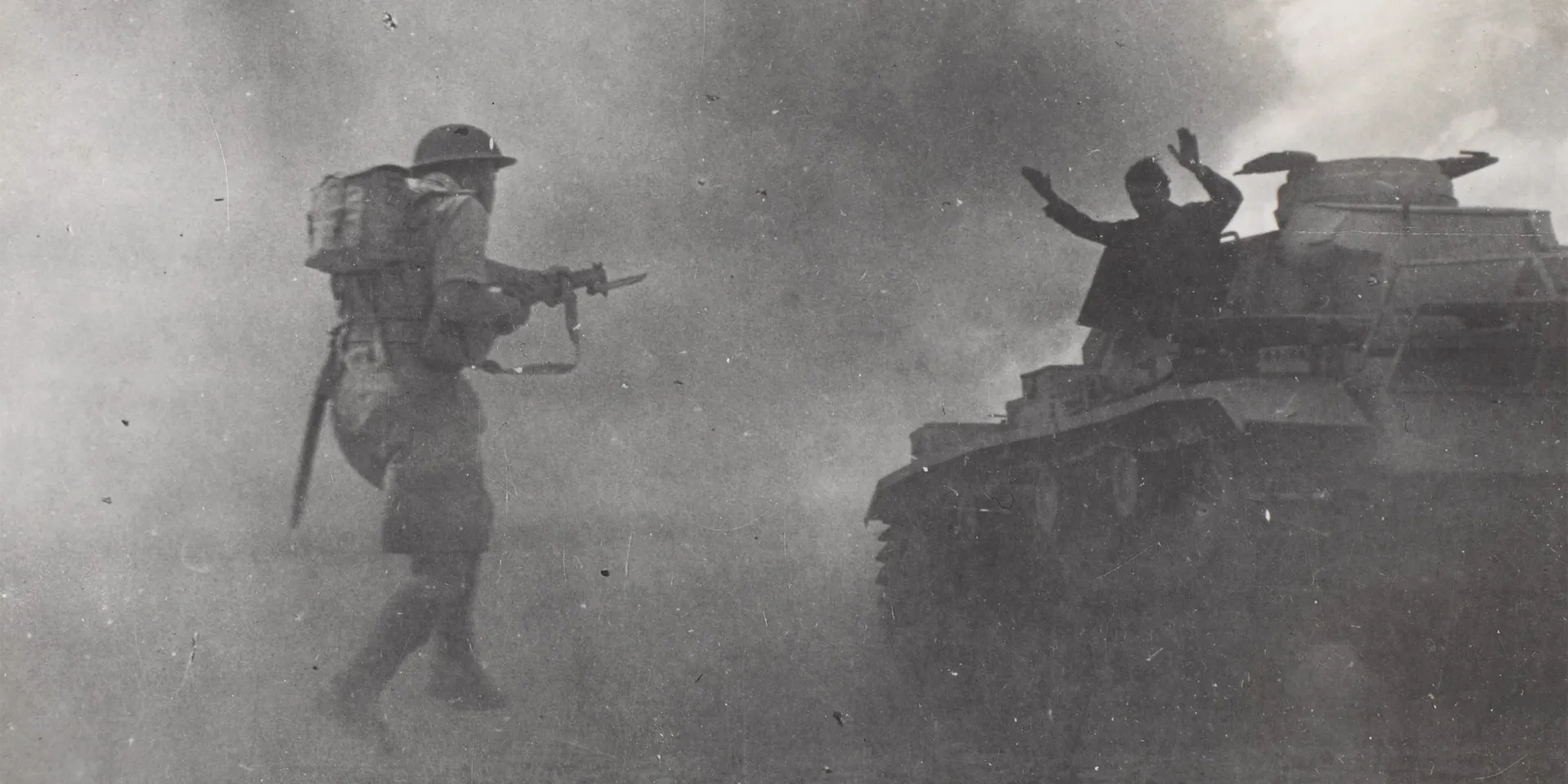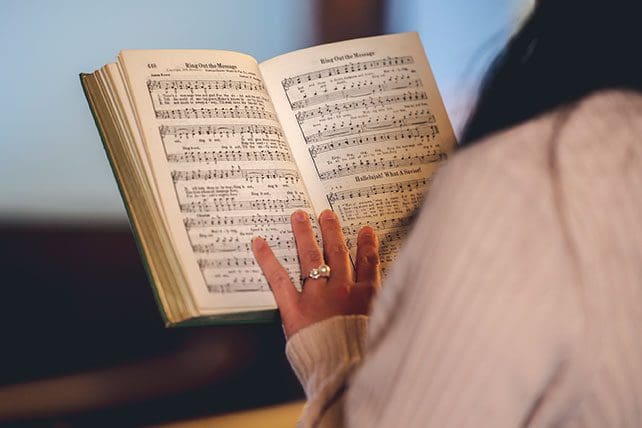Day Is Dying in the West
Lyrics
Heav'n is touching earth with rest;
Wait and worship while the night
Sets her evening lamps alight
Through all the sky.
Holy, holy, holy, Lord God of Hosts!
Heav'n and earth are full of Thee;
Heav'en and earth are praising Thee,
O Lord most high!
Of the universe, Thy home,
Gather us who seek Thy face
To the fold of Thy embrace,
For Thou art nigh.
Heart of Love, enfolding all,
Through the glory and the grace
Of the stars that veil Thy face,
Our hearts ascend.
Pass the stars, the day, the night,
Lord of angels, on our eyes
Let eternal morning rise,
And shadows end.
Bible Reference
Psalm 42:1-2
About This Hymn
“Ye shall have a song, as in the night when a holy solemnity is kept; and gladness of heart, as when one goeth with a pipe to come into the mountain of the Lord, to the mighty One of Israel.” — Isaiah 30:29 (KJV)
In the latter part of the nineteenth century and well into the early twentieth, the Chautauqua Movement emerged as a vital religious and cultural influence across the United States. Established on the serene shores of Lake Chautauqua, near Jamestown, New York—a region often acclaimed as one of the most scenic locations in the world—this movement sought to elevate American life through a blend of religious education and cultural enrichment. At its height, the Chautauqua Assembly drew thousands each summer to its lakeside grounds to hear some of the finest speakers, musicians, and educators of the era. Additionally, it extended its influence through traveling lectures and musical programs across the country. Though it no longer holds the same cultural prominence it once did, the Chautauqua Institution continues its legacy to this day at its beautiful New York location.
One of the most cherished figures associated with this movement was Mary Artemisia Lathbury, born on August 10, 1841, in Manchester, New York, into a devout Methodist family. Her father and two brothers were ordained ministers, and her upbringing reflected a strong emphasis on faith and education. Trained as an artist, Lathbury taught art in schools across Vermont and New York before turning her focus more fully to religious work and writing. Eventually, she became the general editor of Methodist Sunday School publications. Recounting her spiritual calling, Lathbury once shared that she heard the voice of God urging her to consecrate her artistic and poetic talents entirely to His service: “Remember, my child, that you have a gift of weaving fancies into verse and a gift with the pencil of producing visions that come to your heart; consecrate these to Me as thoroughly as you do your inmost spirit.”
Together with Bishop John H. Vincent, Lathbury played a foundational role in the Chautauqua Movement and became widely known as its “Poet Laureate and Saint.” In the summer of 1877, the Chautauqua leadership desired a vesper hymn that could serve as a musical benediction for their evening gatherings. Dr. Vincent asked Lathbury to write such a text. As the story goes, inspiration came to her as she sat gazing at the sun setting over Lake Chautauqua, its brilliant colors casting a tranquil glow across the water. She composed the initial verses of what would become “Day is Dying in the West” that very evening. At the request of her friends, she added two final stanzas two years later to complete the hymn.
The musical setting for Lathbury’s text was composed that same summer by Professor William Fisk Sherwin, who was serving as the music director for the Chautauqua Assembly. Sherwin was well-respected for his exceptional ability to train and conduct amateur choirs and to lead large congregations in spirited yet refined hymn singing. His tune, matched with Lathbury’s poetic imagery, produced a hymn of great emotional depth and spiritual beauty.
George C. Stebbins, a prominent gospel musician of the time, recounted the memorable evening when the hymn was first introduced:
“On a Saturday evening in August, about 2,000 people gathered on the shores of Lake Chautauqua. On the water, near the shore, was a boat containing the Professor and myself. Surrounding us were thirty other small boats filled with men, women, and children. It was a beautiful and awe-inspiring scene as we sang this lovely hymn together.”
Since that evening, “Day is Dying in the West” has remained the official Vesper Hymn for Chautauqua’s evening services. Many hymnologists have praised it as “one of the finest and most distinctive hymns of modern times.” Its evocative language—phrases like “Heaven is touching earth with rest” and “Night sets her evening lamps alight”—combined with the reverent and majestic refrain, make it well-suited for both choir and congregational worship. The hymn captures not only the serenity of evening but also the spiritual peace that descends as believers draw near to the presence of God.
As John Keats once said, “A thing of beauty is a joy forever,” and in the realm of sacred music, few hymns express beauty and reverence more eloquently than “Day is Dying in the West.” The poet John Milton echoed a similar sentiment: “Music, the greatest good that mortals know, and all of heaven we have below.” In Lathbury’s hymn, both the poetic and musical arts are united in a sublime offering of evening praise, gently inviting worshippers to rest in the nearness of the mighty One of Israel.


📬 Subscribe to Our Devotional Updates
Receive weekly hymns, devotionals, and website features directly in your inbox.
Hymn Information

- Category: Hymn
- Author/Writer: Mary A. Lathbury (1878)
- Added: June 12, 2025
- Last Updated: June 12, 2025
- Views: 833
MIDI File
More Hymns by Mary A. Lathbury
Popular Hymns
Recent Blog Posts
Popular Blog Posts
Visit Us on Social Media
Latest from X (Twitter)
Tweets by HymnalLibraryLatest from Facebook
Latest on YouTube
Daily Bible Verse
Disclaimer
The hymns, sheet music, MIDI files, and related content on this website are provided for educational and research purposes only.
- Public Domain: Many of the hymns featured here are in the public domain and may be freely used.
- Copyrighted Works: Some hymns may still be under copyright protection. Where applicable, permission has either been requested from the copyright owner, or the content is shared under the principles of fair use for educational purposes.
⚠️ Important Notice: If you wish to reproduce, distribute, or use any copyrighted hymn beyond personal study or educational use, you must obtain permission directly from the copyright holder. This website does not grant any rights for commercial use yet.
If there is any other question please address it to us in our Contact Page, for further assistance. Thank you for using the site. May God Bless You.












